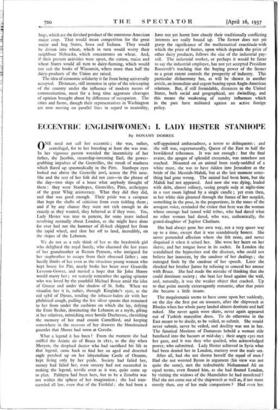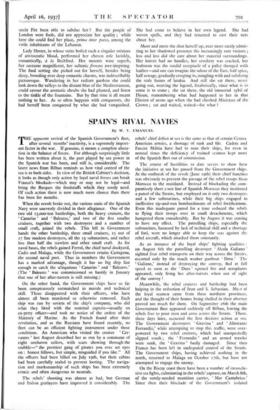ECCENTRIC ENGLISHWOMEN: I. LADY HESTER STANHOPE
By BONAMY DOBREE
ONE need not call her eccentric ; she was, rather, centrifugal, for to her breeding at least she was true. In her vigorous person wrestled the incentricity of her father, the Jacobin, steamship-inventing Earl, the power- grabbing impulses of the Grenvilles, the streak of madness which flared up spasmodically in the Pitts. Stanhope eyes looked out above the Grenville jowl, across the Pitt nose. She and the rest of her folk did not care—in the phrase of the day—two skips of a louse what anybody thought of them : they were Stanhopes, Grenvilles, Pitts, archetypes of the great Whig aristocracy. What they did they did, and that was good enough. Their pride was a carapace that kept the shafts of criticism from even tickling them ; and if by any chance they were not rich enough to do exactly as they wanted, they behaved as if they were. Yes, Lady Hester was true to pattern, for some years indeed revolving normally about London, as she might have done for ever had not the hammer of ill-luck chipped her. from the rapid wheel, and shot her off to land, incredibly, on the slopes of the Lebanon.
We do not as a rule think of her as the hoydenish girl who delighted the royal family, who charmed the last years of her grandmother at Burton Pynsent, who intrigued for her stepbrother to escape from their obsessed father ; one hardly thinks of her even as the vivacious young woman who kept house for Pitt, nearly broke her heart over Granville Leveson-Gower, and nursed a hope that Sir John Moore would marry her ; we scarcely remember the ageing spinster who was loved by the youthful Michael Bruce amid the isles of Greece and under the shadow of St. Sofia. When we visualise her it is, rather, through Kinglake's eyes, as the old sybil of Djoun, rending the tobacco-laden air with her phthisical cough, pulling the few silver spoons that remained to her from under the cushions on which she lay, defying the Emir Bechir, dominating the Lebanon as a myth, gibing at her relatives, mimicking once hostile Duchesses, cherishing the memory of her mad cousin Camelford, and keeping somewhere in the recesses of her drawers the bloodstained gauntlet that Moore had worn at Coruiia.
What a legend it has been ! From the moment she had sniffed the Asiatic air of Brusa in an, to the day when Meryon, the despised doctor who had sacrificed his life to that legend, came back to find her an aged and deserted eagle perched up on her labyrinthine Castle of Otranto, kept living only by her pride. Society had failed her, money had failed her, even sorcery had not succeeded in making the legend, terrific even as it was, quite come up to plan. Palmyra had been hers, but to be a Zenobia was not within the sphere of her imagination ; she had tran- scended all law, even that of the Faithful ; she had been a self-appointed ambassadress, a terror to delinquents ; and she still was, supernaturally, Queen of the East to half the bewildered tribesmen. It was not enough : but the final avatar, the apogee of splendid crescendo, was somehow not reached. Mounted on an animal born ready-saddled of a white mare, she was to have ridden into Jerusalem as the bride of the Messiah,-Mandi, but at the last moment some- thing had gone wrong. The animal had been born, but the Mandi had not appeared. And now she was dying, loaded with debt, almost solitary, seeing people only at night-time in a vast room lighted by a single candle ; yet even then, as her white skin gleamed through the fumes of her nargileh, something in the pose, in the proportions, in the tones of the arrogant voice, reminded the visitor that here was the woman whose courage had tamed wild tribes, who had dared what no other woman had dared, who was, authentically, the grand-daughter of Jupiter Chatham.
She had always gone her own way, not a very queer way up to a time, except that it was scandalously honest. She never pretended affection where she felt none, and never disguised it when it seized her. She wore her heart on her sleeve, and her tongue loose in its socket. In London she scandalised the hypocrites and the discreet, who could not believe her innocent, by the candour of her dealings ; she outraged fools by the candour of her speech. Later she shocked her brother James by refusing to conceal her amour with Bruce. She had made the mistake of thinking that she could dominate society ; she beat her head against the wall, and, naturally, it was the weaker object that cracked. Up to that point merely extravagantly romantic, after that point she became a little insane.
The megalomania seems to have come upon her suddenly, on the day she first put on trousers, after the shipwreck at Rhodes when her whole party landed almost destitute and half naked. She never again wore skirts, never again appeared out of Turkish masculine dress. To do otherwise in the East meant to be docile, to be veiled, to submit. She would never submit, never be veiled, and docility was not in. her. The fanatical Moslems of Damascus beheld a woman ride barefaced into the bazaars at mid-day ; their angry eyes met her gaze, and it was they who quailed, who acknowledged power, who submitted. Lady Hester achieved in Syria what had been denied her in London, mastery over the male sex.
After all, had she not shown herself the equal of men ? Had she not worsted Byron in argument (his view was not quite the same), met the redoubtable Mohammad Ali on equal terms, even flouted him, as she had flouted London, by visiting the widows of the Mamelukes he had murdered ? Had she not come out of the shipwreck as well as, if not more stoutly than, any of her male companions ? Had even her. uncle Pitt been able to subdue her ? But the people of London were fools, did not appreciate her quality ; while here she could find her place, prima inter pares, among the virile inhabitants of the Lebanon.
Lady Hester, in whose veins boiled such a singular mixture of aristocratic blood, performed her chosen role lavishly, romantically, a la Beckford. Her mounts were superb, her costume magnificent, her sultanic firmans awe-inspiring. The final setting she picked out for herself, besides being dizzy, brooding over deep romantic chasms, was indescribably picturesque. Wandering in her radiant gardens she could look down the valleys to the distant blue of the Mediterranean, could savour the aromatic shrubs she had planted, and listen to the tinkle of the fountains. But by that time it all meant nothing to her. As so often happens with conquerors, she had herself been conquered by what she had vanquished. She had come to believe in her own legend. She had woven spells, and they had returned to cast their nets about her.
More and more she shut herself up, ever more rarely admit- ting to her shadowed presence the increasingly rare visitors ; less and less did she care about her material surroundings. Her knives had no handles, her crockery was cracked, her bedroom was the sordid receptacle of a pallet thonged with leather—and one can imagine the odour of the East, half spice, half sewage, gradually creeping in, mingling with and subduing the stale fumes of latakia. And still she sat there, never going out, weaving the legend, fatalistically, since what is to come is to come ; she sat there, the old immortal sybil of Djoun, remembering what had happened to her in that illusion of aeons ago when she had checked Ministers of the Crown ; sat and waited, waited—for what ?























































 Previous page
Previous page